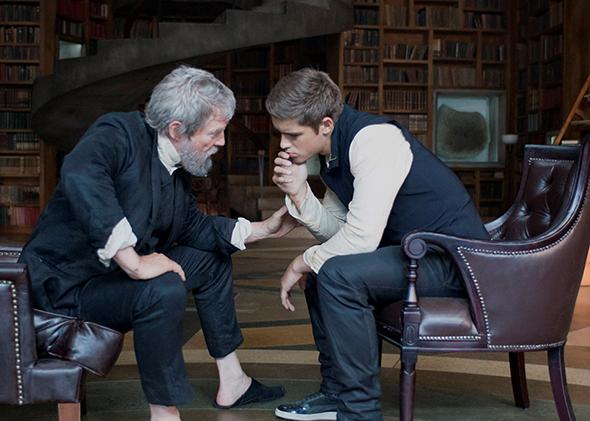Lois Lowry’s 1993 children’s novel The Giver is a masterpiece of dystopian fiction. In less than 200 pages, without much plot to speak of, Lowry slowly and gently pulls the curtain back on a society so totalitarian it outlaws pets, music, colors, wet dreams, and grandparents. Despite the repression of the society they live in, the characters in The Giver are recognizably human: They play games, joke about bureaucracy, gossip about one another’s intelligence. There are no bad guys in The Giver, exactly. It’s a book about the evil that good people can commit when they complacently submit to societal pressure—a book about how evil functions in the real world, in other words.
It would be difficult, but not impossible, for a skilled filmmaker to adapt Lowry’s novel into a quiet, intelligent movie, something along the lines of 2010’s Never Let Me Go. Phillip Noyce’s The Giver, in wide release today, is not that movie. Where Lowry’s book is subtle, disarmingly simple, and humane, Noyce’s film is loud, overly complicated, and cynical. Nothing can rescue this clunker of an adaptation, not even the usually divine Meryl Streep, B-roll footage of cute baby animals, or some rad-looking futuristic bicycles.
The film stars Australian heartthrob Brenton Thwaites as Jonas, who informs us in a voiceover within the first minute of the movie that he has no last name because he lives in a post-apocalyptic community founded on “sameness.” Jonas is about to graduate from the community’s version of high school with his two best friends, Fiona (Odeya Rush) and Asher (the scowling Cameron Monaghan), who we know are oppressed weirdos because their idea of fun is not sex or beer or video games but walking through a fountain in the center of their town.
Much to Jonas’ surprise, the Chief Elder (Streep) announces in front of the entire community that Jonas has been selected as the Receiver of Memories, a job that entails hanging out with the Giver (Jeff Bridges) in his creepy cliffside mansion, reading the books that are banned in the rest of the town and receiving telepathic lessons about life before sameness. What was life like? Cue 20th-century news clips: The fall of the Berlin Wall, the unknown protester at Tiananmen Square, Nelson Mandela. (These latter two are among the only people of color in the film—“sameness” is, in part, a euphemism for eugenics.)
These collective memories inspire Jonas to take action to liberate his community from their ignorant conformism, which in turn inspires the screenwriters to take enormous liberties with their source text. The second half of The Giver features a steamy Renaissance-era makeout scene, a motorcycle chase, a standoff with a drone, and Taylor Swift, among other things that do not appear in Lowry’s novel. The problem isn’t that the movie changes the novel, necessarily; it’s that none of these new additions makes much sense, even superficially.
Particularly puzzling is Streep’s sinister character, who is basically Miranda Priestly from The Devil Wears Prada with messier hair (but equally stylish wedges). Early in the film, she interrogates Jonas about what he does with the Giver, which indicates that she’s in the dark about the memories the Giver is showing him. Later, she delivers a contemptuous monologue that indicates she understands exactly what freedoms her society has given up in the name of security. Is she an unwitting instrument of authoritarianism or an evil mastermind? It’s not clear—not even to Streep, apparently, who mostly phones in her performance. (Literally: Her character inexplicably appears as a sort of video-conference hologram in most of her scenes.)
Bridges, The Giver’s other dramatic heavyweight (and one of its producers), doesn’t accomplish much more with his hackneyed role as a gruff, grieving, gravelly voiced old man who carries the weight of the world on his shoulders. As for the newcomers: Thwaites is appealing enough as Jonas, and his performance certainly isn’t an embarrassment, but he overcomes neither the lackluster script nor his lack of chemistry with his co-stars. The love triangle the film concocts among Jonas, Fiona, and Asher—and the difficult decisions that Fiona and Asher consequently face—feel completely unmotivated, except by the imperative that a feature film be longer than 70 minutes. And that, post-Hunger Games, you gotta have a love triangle.
It would be shocking if the filmmakers didn’t try to beef up The Giver’s marketability while adapting it for the screen. But the trailer-friendly elements of the film—the slick technology and the sexual tension and the high-octane manhunt—run totally counter to the very simplicity that makes the book a classic. Lowry’s novel, one of children’s literature’s great stories of nonconformity, deserved an adaption that dared to be a little bit different, instead of the cookie-cutter Hollywood sameness that it got.
